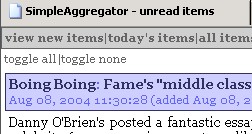I'm rewriting the mess of scripts I use to manage this site to give them more stability, something like an architecture, and to add some important features. Up until tonight I knew how to implement categories and archives, then when I was walking the dogs (which is my usual -- and only -- zen-like moment) I started wondering what should happen to archives when you are inside a category.
I have always thought of categories as just a kind of alternative, filtered index and syndication pages for new entries. It's a good feature, one that not all blogs use, which better defines entries and allows me to offer only my Python category feed to planetpython without cluttering it with unrelated stuff. And I always thought of archives as, well archives, a date-based hierarchy ordered by year/month and possibly day, where for each date you have an index page offering different levels of details on the relevant entries, eg a blog/2004/ page with entry titles, a blog/2004/January page with titles and abstracts, and so on.
But what should happen when you're looking at a category page, and click on an archive link? Should you get a filtered archive page displaying only Python entries for that period? Does it make any sense, would it be useful? Or are archives just "storage", a different sort of categorization, unrelated to categories? Is it enough to show the entries' categories in the archives pages (eg next to the tile in the year view), to allow people to "visually" filter out entries?
Tangled in these deep thoughts, I came back home and had a look at a few well known blogs. Guess what? Everybody does things differently. Some blogs have categories, some archives, some both but categories are just index pages with no effect on archives, etc. Since I will be generating static .html pages the difference in implementing category archives will be huge, not in terms of code but in terms of time taken to rebuild the site, and load on the storage backend. But then you won't need to rebuild the site that much (publishing or modifying an entry means regenerating only the relevant pages), and you might gain something in search engines visibility by more deeply crosslinking your site. Uhm.....

